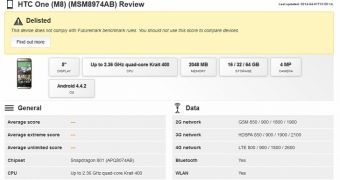Last week, Taiwanese mobile phone maker HTC Corporation unveiled to the world its latest Android-based flagship handset, in the form of HTC One M8, which has already landed on the market with some appealing performance capabilities packed inside.
Initial benchmarking tests even found it to be able to perform much better than other high-end devices out there could, including the Samsung Galaxy S5 and the Sony Xperia Z2, but it seems that the phone is not that great in the end.
HTC was already been discovered to have tweaked the phone’s software so as to ensure that it can top benchmarks, and the company even admitted to that.
However, it seems that the company does not see the performance adjustments that it made to the device as cheats. At least this is what it said in a statement to CNET.
“Benchmarking tests look to determine maximum performance of the CPU and GPU and, similar to the engine in a high-performance sports car, our engineers optimize in certain scenarios to produce the best possible performance,” the company reportedly maintained.
“If someone would like to get around this benchmarking optimization there are ways to do so, but we think most often this will not be the case.”
Moreover, the company said that the new smartphone was packed with a High Performance Mode that would allow people to get the most out of it even when not testing it.
According to the company, the software enhancement was put there so that any users who would like to enjoy more performance on the smartphone could do so, with only a few clicks.
Basically, those who purchase the new HTC One (M8) should head over to the settings menu, find the aforementioned High Performance Mode and enable it. However, the battery life of the device might suffer when doing to, it seems.
“For those with a need for speed, we’ve provided a simple way to unleash this power by introducing a new High Performance Mode in the developer settings that can be enabled and disabled manually,” the company added.
“The HTC One (M8) is optimized to provide the best balance of performance and battery life, but we believe in offering customer choice, as there may be times when the desire for performance outweighs the need for battery longevity.”
Although HTC sees this more like a feature designed to ensure that users can get the most out of their handsets, others don’t see it as such, especially people behind benchmarking apps, who are looking to ensure that their software is as accurate as possible.
Futuremark, for example, has decided that the handset should not be present in its database as long as it cheats in tests and has already delisted it.
“This device does not comply with Futuremark benchmark rules. You should not use this score to compare devices,” the company notes on the phone's page on its website.
Last year, various Android phones from leading handset vendors out there were found to feature similar tweaks that allowed them to deliver better benchmarking test results, and also got the boot.
However, with their makers already resolving the issue via software updates, these devices returned to benchmark websites out there, and the same might happen with the new HTC One (M8), should the Taiwanese company act upon it.

 14 DAY TRIAL //
14 DAY TRIAL //